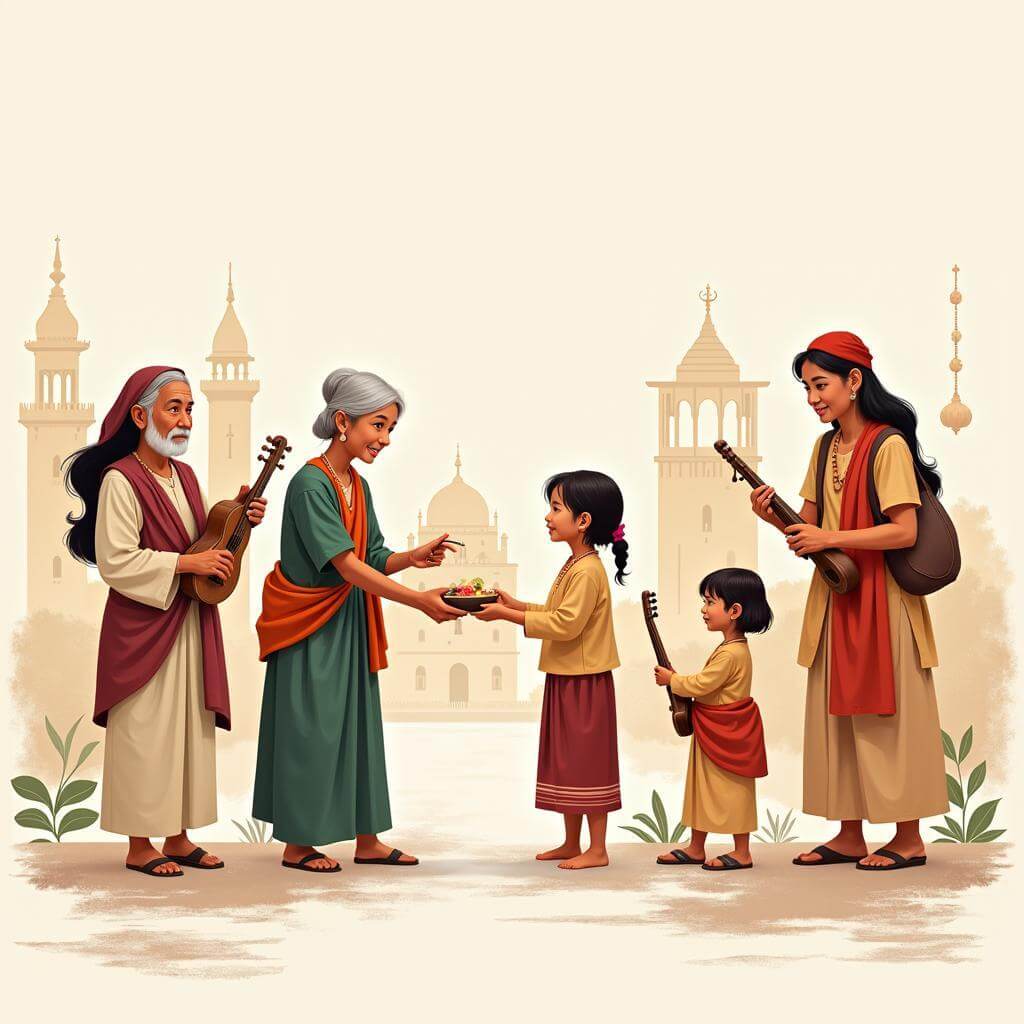Cultural events are a common topic in IELTS Speaking tests, particularly in Part 2. Being able to vividly describe a cultural experience can significantly boost your score. This article will guide you through answering questions about attending a cultural event, with sample answers for different band scores.
Part 1: Introduction and Interview
In Part 1, the examiner may ask general questions about cultural events. Here’s a sample question with a suggested answer:
Examiner: Do you enjoy attending cultural events?
Sample answer (Band 7-8):
Yes, I absolutely love attending cultural events. They provide a unique opportunity to immerse myself in different traditions and customs. I find it fascinating to learn about various cultures through music, dance, food, and art. It’s always an eye-opening experience that broadens my horizons and helps me appreciate the diversity of our world.
Part 2: Long Turn
Here’s a sample cue card for the Long Turn section:
Describe a time when you went to a cultural event
You should say:
- What the event was
- Where and when you attended it
- Who you went with
- And explain how you felt about the event
Sample answer (Band 6-7):
I’d like to talk about a cultural event I attended last year. It was a traditional lantern festival in my hometown. The event took place in the city center, around the main square and along the river. I went there with my family on a cool autumn evening in September.
The festival was really beautiful. There were hundreds of colorful lanterns floating on the river and hanging in the trees. People were walking around in traditional clothes, and there were food stalls selling local snacks. I remember the smell of incense and the sound of traditional music playing in the background.
I felt excited to be part of this event. It was interesting to see how people celebrated our culture and traditions. I enjoyed watching the lantern-making competition and tasting different foods. The atmosphere was very lively and festive.
Overall, I had a great time at the lantern festival. It made me feel proud of my cultural heritage and helped me understand our traditions better. I think events like this are important for keeping our culture alive and sharing it with younger generations.
Sample answer (Band 8-9):
I’d like to describe a captivating cultural event I attended last autumn – the Annual Lantern Festival in my hometown. This enchanting celebration took place in the heart of our city, transforming the main square and the adjacent riverbank into a mesmerizing spectacle of lights and colors.
I ventured to this awe-inspiring event with my family on a crisp September evening. The air was filled with a palpable sense of excitement as we joined the throngs of people gathered to partake in this time-honored tradition.
The festival was nothing short of breathtaking. Hundreds of intricately designed lanterns in a myriad of hues adorned the trees and floated gracefully on the river’s surface, creating a magical ambiance. The ethereal glow of the lanterns against the darkening sky was truly spellbinding.
What struck me most was the immersive nature of the event. Locals and visitors alike were donned in vibrant traditional attire, adding to the authentic atmosphere. The tantalizing aroma of incense wafted through the air, intermingling with the enticing scents emanating from food stalls offering an array of local delicacies. The melodious strains of traditional music provided a captivating backdrop to the entire experience.
I found myself utterly enthralled by the festivities. The lantern-making competition was particularly fascinating, showcasing the remarkable craftsmanship and creativity of the participants. Sampling various regional specialties was a culinary adventure that delighted my taste buds.
This cultural extravaganza left an indelible impression on me. It instilled a profound sense of pride in my cultural heritage and deepened my appreciation for our traditions. The lantern festival served as a poignant reminder of the importance of preserving and celebrating our cultural roots, especially in this rapidly modernizing world.
In retrospect, attending this event was not merely entertaining but also enlightening. It underscored the significance of such cultural gatherings in fostering community spirit, bridging generational gaps, and ensuring the continuity of our rich cultural legacy. The memories of that enchanting evening continue to resonate with me, serving as a testament to the power of cultural events in enriching our lives and strengthening our connection to our heritage.
Follow-up questions:
- How did this event compare to other cultural events you’ve attended?
- Do you think such traditional events are important in modern society? Why or why not?
Sample answer for question 1 (Band 7-8):
This lantern festival was undoubtedly one of the most memorable cultural events I’ve ever attended. Compared to other events, it stood out due to its sheer scale and visual impact. While I’ve been to music festivals and art exhibitions before, this lantern festival offered a unique blend of visual beauty, traditional customs, and community participation. It was more immersive and engaging than many other events, as it allowed visitors to actively participate by making and floating lanterns, rather than just being passive observers. The festival also had a stronger emotional resonance for me, as it connected deeply with my cultural roots in a way that more modern or international events often don’t.
Sample answer for question 2 (Band 8-9):
I firmly believe that traditional events like this lantern festival play a crucial role in modern society for several reasons. Firstly, they serve as a vital link to our cultural heritage, helping to preserve and pass down customs and traditions that might otherwise be lost in our rapidly changing world. These events provide a tangible connection to our past, allowing younger generations to experience and understand their cultural roots firsthand.
Secondly, in an increasingly globalized and digitalized world, such events offer a much-needed sense of community and belonging. They bring people together in a shared experience, fostering social bonds and strengthening community ties. This is particularly important in modern urban societies where people often feel disconnected from their neighbors and cultural backgrounds.
Moreover, traditional events can be a source of cultural pride and identity, which is essential in maintaining diversity in our multicultural societies. They remind us of the richness and uniqueness of different cultures, promoting understanding and respect among diverse groups.
Lastly, these events can have significant economic and tourism benefits for local communities. They attract visitors, boost local businesses, and can help preserve traditional crafts and skills that might otherwise disappear.
However, it’s important to note that for these events to remain relevant, they must strike a balance between preserving tradition and adapting to modern sensibilities. This might involve incorporating new technologies or addressing contemporary issues while maintaining the core cultural elements. By doing so, traditional events can continue to be meaningful and engaging for future generations, ensuring their longevity and importance in modern society.
Part 3: Two-way Discussion
In Part 3, the examiner will ask more abstract questions related to the topic. Here’s an example:
Examiner: How do you think cultural events impact a community?
Sample answer (Band 6-7):
I think cultural events have a positive impact on communities. They bring people together and help them learn about their traditions. These events can make people feel proud of their culture and history. They’re also good for the local economy because they attract tourists and create jobs.
Cultural events can help preserve old customs and teach young people about their heritage. This is important because many traditions are being forgotten in modern times. These events also give people a chance to have fun and celebrate together, which can improve community spirit.
However, sometimes these events can cause problems like noise or crowding, especially in small towns. But I think the benefits usually outweigh these issues.
Sample answer (Band 8-9):
Cultural events can have a profound and multifaceted impact on communities. Firstly, they serve as powerful catalysts for social cohesion, bringing diverse groups of people together in a shared experience. This fosters a sense of unity and belonging, which is crucial for building strong, resilient communities.
Moreover, these events play a vital role in preserving and promoting cultural heritage. In our rapidly globalizing world, there’s an increasing risk of cultural homogenization. Cultural events act as a bulwark against this trend, helping to maintain the unique identity and traditions of a community. They provide a platform for intergenerational knowledge transfer, ensuring that customs, skills, and stories are passed down to younger generations.
From an economic perspective, cultural events can be significant drivers of local prosperity. They often attract tourists, stimulate local businesses, and create employment opportunities. This economic boost can be particularly beneficial for small communities or those struggling with economic challenges.
Furthermore, these events can serve as powerful educational tools. They offer immersive, experiential learning opportunities that can be far more effective than traditional methods in teaching about history, culture, and social values. This is especially important for children and young people, helping them develop a strong sense of identity and cultural awareness.
However, it’s important to acknowledge that the impact of cultural events isn’t always entirely positive. Large-scale events can sometimes lead to issues such as overcrowding, environmental strain, or cultural commodification. There’s also a risk of events becoming overly commercialized, potentially diluting their cultural significance.
Despite these challenges, when managed thoughtfully, cultural events have the potential to strengthen community bonds, preserve cultural heritage, boost local economies, and foster intercultural understanding. They play a crucial role in maintaining the rich tapestry of human culture in our increasingly interconnected world.
Key Vocabulary and Phrases for High Scores
To achieve a high score in IELTS Speaking, incorporating advanced vocabulary and idiomatic expressions is crucial. Here are some key terms and phrases that can elevate your responses:
-
Immerse oneself /ɪˈmɜːs wʌnˈself/ (phrasal verb): To involve oneself deeply in an activity or interest.
Example: “The festival allowed me to immerse myself in the local culture.” -
Captivating /ˈkæptɪveɪtɪŋ/ (adjective): Very attractive or fascinating.
Example: “The lantern display was truly captivating, drawing everyone’s attention.” -
Time-honored /taɪm ˈɒnəd/ (adjective): Respected or valued because it has existed for a long time.
Example: “The festival is a time-honored tradition in our community.” -
Myriad /ˈmɪriəd/ (noun/adjective): A countless or extremely large number.
Example: “There was a myriad of cultural activities to enjoy at the event.” -
Resonate /ˈrezəneɪt/ (verb): To evoke or suggest images, memories, and emotions.
Example: “The traditional music resonated deeply with the older generation.” -
Cultural heritage /ˈkʌltʃərəl ˈherɪtɪdʒ/ (noun phrase): The legacy of physical artifacts and intangible attributes of a group or society.
Example: “Such festivals play a crucial role in preserving our cultural heritage.”
 Concept of preserving cultural heritage through generations
Concept of preserving cultural heritage through generations
Tips from an IELTS Examiner
As an experienced IELTS examiner, I recommend the following strategies to excel in the Speaking test:
-
Practice regularly: Engage in daily conversations in English, focusing on describing experiences and expressing opinions.
-
Expand your vocabulary: Learn new words and phrases related to culture and events, and practice using them in context.
-
Use a variety of sentence structures: Mix simple and complex sentences to demonstrate your language proficiency.
-
Develop your ideas: Don’t just give short answers. Elaborate on your points with examples and personal experiences.
-
Work on your pronunciation: Pay attention to word stress and intonation. Clear pronunciation is key to effective communication.
-
Stay calm and confident: Remember, the examiner is there to assess your English, not to trick you. Stay relaxed and speak naturally.
-
Listen carefully to the questions: Make sure you understand what’s being asked before answering.
-
Be honest: If you don’t understand a question, it’s okay to ask for clarification.
By following these tips and practicing regularly, you can significantly improve your performance in the IELTS Speaking test. Remember, the key is to communicate effectively and confidently, showcasing your English language skills to the best of your ability.
For more IELTS Speaking practice, you might want to try describing a famous building or monument you visited or describing a tourist attraction that disappointed you. These topics can help you further develop your descriptive language skills and ability to express opinions, which are crucial for success in the IELTS Speaking test.


